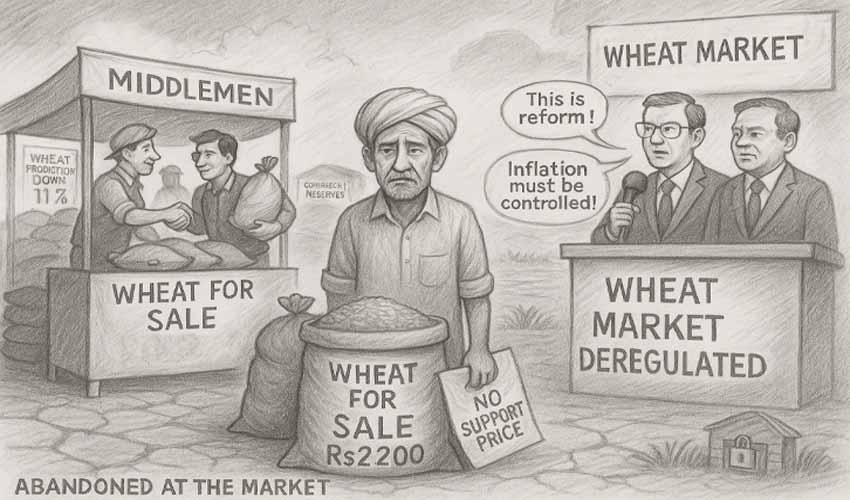Punjab farmers are furious again, this time over the government’s goofy agriculture policies. Amid protests, farmers have demanded that authorities immediately impose an agriculture emergency and announce wheat support price. The government, on the other hand, has absolved itself from all responsibility by deregulating the wheat market for the first time and suspending procurement second year in a row, leaving stakeholders confused and directionless.
The Punjab government’s recent refusal to announce an indicative wheat rate reeks of a hands-off policy, conveniently disguised as market reform. In the absence of a support price, farmers are compelled to sell their crop for somewhere between Rs1,900 and Rs2,500 per 40kg, almost half the last year’s market rate. Growers cry foul, claiming they are at the losing end because the production cost far outweighs what bulk buyers have to offer. Additionally, ‘middlemen’ are there at every stage, claiming their cut in deals, further bringing down farmers’ revenue.
To make matters worse, a staggering 11% drop in wheat production is expected this year, plunging from last year’s record 31.6 million tons to merely 27.5 million tons. Consumption, however, is expected to stay somewhere near 31.9 million tons after a slight increase. With imports banned and provincial stockpiles locked away, Pakistan is hurtling toward yet another wheat crisis. It is also unclear whether the demand-supply gap will be filled by the carry-forward stock, if any, or imports will be allowed.
The idea that the Punjab government wants to protect 140 million people from inflation is understandable. However, policymakers’ decisions to ensure flatbread does not get heavy on the pockets of the public must also not leave rural farmer bankrupt
The wheat support price is the only thing that gives farmers a sense of stability. Before abruptly changing the system that has been in place for more than six decades, the government must ensure that its “free market” policy does not give farmers the impression of abandonment. The idea that the Punjab government wants to protect 140 million people from inflation is understandable. However, policymakers’ decisions to ensure flatbread does not get heavy on the pockets of the public must also not leave rural farmer bankrupt.
On the other hand, authorities are justified to call out those giving exaggerated statements regarding wheat production cost, but stripping farmers of their negotiating power and handing over control to exploiters and profiteers is also beyond the pale. Two wrongs can never make a right. If wheat stability is a national priority, then abandoning growers is not an option. The authorities must sit down with the farmers and other stakeholders to devise a framework that works out for both the growers and the consumers.

























